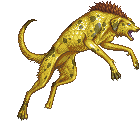Viewing fAb3u

Father: Unknown
Unknown Pedigree
Hardiness: 15
Appearance: 5
Emerged: 6:33 23.03.2022
Matured: 21:54 24.03.2022
In areas where Luna Hundos roam, it is not uncommon to hear their deep howls echoing across the plains on cloudless nights, communicating everything from position to location of prey. These nocturnal canines often hunt alone or in pairs, though they will call each other to track down larger quarry if the opportunity presents itself. Long, slender legs allow them to lope effortlessly after their prey for hours, wearing it down until they can leap forward with a sudden burst of speed to make the kill. No pack structure has been observed, but a loose hierarchy is present when multiple Luna Hundos gather together, with the strongest and most aggressive taking the lead in hunts and eating first. They do not make sounds other than their deep howls, but they are very expressive with their body language, in particular their tail and ear movement. Juveniles are raised by both parents until old enough to hunt on their own. Littermates often hunt together for the first few months after their parents' departure before separating.
The creatures that dwell in this rather desolate world still display some diversity in appearance, eating habits, and social behavior. Whether they have fur or feathers, skin or scales, their unique genetic makeup allows for a variety of colors and markings within each species. Despite limitations in food sources, herbivores, omnivores, and carnivores are all present in the food chain, and each species requires specialized care within a laboratory. Although the artificial setting of housing units and breeding pods precludes most opportunities to study true interspecific behavior, the interactions within and between species has been studied extensively in the wilderness by scientists daring enough to venture beyond the outpost’s walls.
